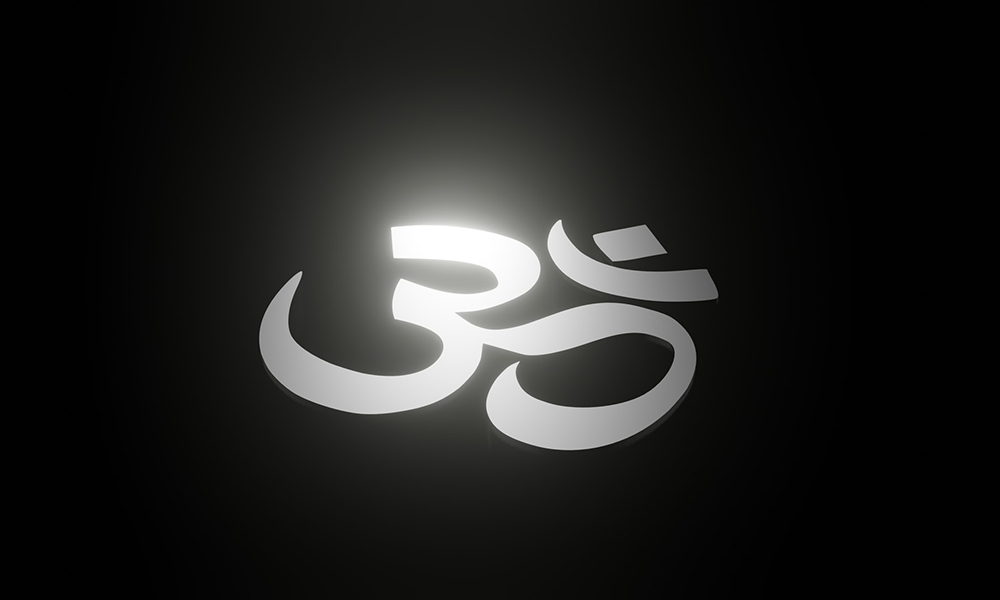If you have ever been to a yoga class, you might be familiar with the sound ‘om’ that you are often invited to chant along with your teacher.
Typically, your yoga instructor will invite you to chant this three times to open or close a session.
If you have never done it before, it might feel a little awkward to do in a classroom full of strangers, but it’s such an important part of your yoga practice and once you are aware of its meaning, you will be happy to join in on the sound ‘om’ in your yoga classes.
What Does ‘Om’ Mean In Yoga?
‘Om’ is a mantra and sacred sound that is traditionally chanted during the beginning and end of a yoga practice.
It is a Sanskrit word meaning ‘source’ or ‘supreme’ and is believed to be the sound of the universe according to Hindu beliefs.
By chanting ‘om,’ we are engaging in a spiritual practice that connects us to all living creatures that exist in the universe.
While it might seem like a basic sound, there is a method behind the way we pronounce ‘om.’
In terms of how the word is pronounced, when we ‘om’, we are actually chanting ‘aum.’
When chanting this sacred sound, you must break it into three syllables (A-U-M).
The first syllable (A) is pronounced “Ahhhhh” and begins in the back of your throat.
The second syllable (U) is pronounced “Oooooooooh” and if pronounced correctly, you should start to feel your throat vibrate.
The third syllable (M) is said like “mmmmm” which sounds a lot like the noise you would make if you were to eat something delicious.
By this point, you should be able to feel your mouth and lips vibrating.
Some might argue that there are actually four syllables in this chant, as the last syllable comes when you allow your ‘mmm’ to taper off into a deep silence.
This final moment is known as the silent syllable.
As the chant comes to a close, you should feel a powerful energy permeating the room for a few moments after the chant comes to a close.
Why Do We Chant ‘Om’?
Astonishingly, the sound vibration that occurs when we chant ‘om’ is more important than the actual word itself.
Chanting ‘om’ should start a ripple effect of tiny vibrations flowing throughout your entire body.
While these vibrations feel good to us physically, studies have shown that om chanting has positive effects on the brain as well.
Here are some of the benefits of chanting ‘om’:
- It calms the autonomic nervous system (responsible for regulating heart rate, blood pressure, metabolism, and other internal functions) and deactivates limbic brain regions (an area where emotions, memories and arousal are controlled). This effect on the body promotes relaxation.
- It may be able to change delta waves in the brain, allowing you to plunge into a state of deep relaxation and help you get a good night’s sleep.
- It has a similar effect on the brain as vagus nerve stimulation, which is a well-known treatment for both depression and epilepsy. This means that chanting ‘om’ may be able to alleviate symptoms of major depressive disorder.
How Did The ‘Om’ Chant Come To Be?
The word ‘om’ was first discovered in the Vedas, sometime between 1500-1200 BC among a collection of Vedic Sanskrit hymns that were sung in praise of the Divine.
At first, they were not written out, but they were vibrated into existence through human speech.
The metaphysics of the word ‘om’ were later broken down and documented in ancient Indian mystical texts called the Upanishads.
The mantra ‘om’ was further explored when the Yoga Sutras of Patanjali arranged the Eight Limbs of Yoga.
The sixth limb, Dharana, which focuses on concentration, outlined several methods of guiding the mind to a state of single-focused attention.
Repeating a mantra, especially ‘om’ was an essential method of mastering this sixth stage of yoga.
Pantanjali placed such a high importance on chanting ‘om’ that he would teach his students that simply doing so would help them achieve their goal.
In other words, if all else fails, chant ‘om.’







